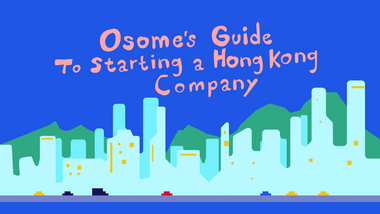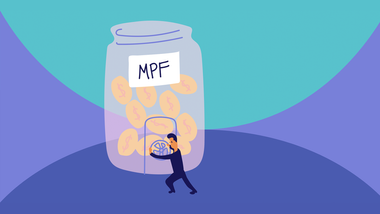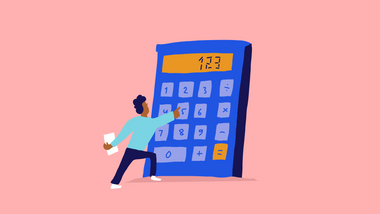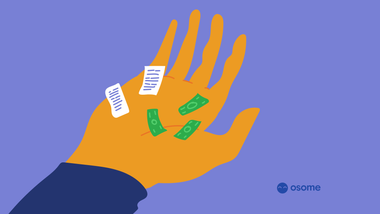Latest Posts

How Profit Tax Exemptions Work for Hong Kong Companies
In Hong Kong, tax exemptions are applied to profits received from offshore funds. Here’s how to apply so your offshore company can benefit.
Better Business
 Better Business
Better BusinessHow Machine Learning Can Help Tech Business Owners
In the dynamic landscape of the tech industry, machine learning has become a transformative force for Hong Kong business owners, offering unparalleled opportunities for growth, efficiency, and innovation. Learn more about it’s potential for your business.
·4 min read- Money Talk
How Profit Tax Exemptions Work for Hong Kong Companies
In Hong Kong, tax exemptions are applied to profits received from offshore funds. Here’s how to apply so your offshore company can benefit.
·7 min read  Better Business
Better BusinessMastering Financial Forecasting for New Business Owners
Discover the full potential of your startup through financial forecasting. Gain reliable insights for success and make attracting investors a breeze with clear financial projections. Visit Osome today for the tools to empower your startup's financial future.
·5 min read Incorporation
IncorporationAll You Need To Know To Start a Trading Company in Hong Kong
Start your journey in the dynamic world of trading companies in Hong Kong. From understanding the types of trading companies to the nuances of Hong Kong-China Free Trade Agreement, learn how to start a trading company in Hong Kong with Osome.
·9 min read Better Business
Better BusinessWhat Is a Nominee Director for Hong Kong Businesses
A nominee director fulfils the local director requirement with primarily administrative duties. They provide benefits like anonymity and local credibility, but their appointment requires careful consideration to mitigate risks like loss of control and strategic mismatches.
·10 min read Better Business
Better BusinessUnderstanding Hong Kong's Tenant Protection Act and Its Importance
Discover the significance of Hong Kong's Tenant Protection Act (TPA), a crucial legislative measure safeguarding rights of landlords and tenants, and how it promotes fair rental practices in Hong Kong.
·6 min read Better Business
Better BusinessA Quick Guide to Directors' Duties in Hong Kong
Understand the intricacies of the duties of a director in Hong Kong. From acting in good faith and avoiding conflict of interest, to keeping accurate accounting records — these responsibilities are essential for your company's success. Explore Osome’s guide for deeper insights.
·7 min read Better Business
Better BusinessHow To Set Up a Hawker Stall Business in Hong Kong
Discover the exciting journey of setting up a hawker stall in Hong Kong. From licensing and regulations to choosing the perfect location, learn all about maximising profitability and becoming part of this vibrant food culture. Start serving delicious dishes today!
·4 min read Money Talk
Money TalkHow To Conduct MPF Withdrawal Before Leaving Hong Kong?
Discover Osome’s guide on how to withdraw your Mandatory Provident Fund (MPF) before leaving Hong Kong. From understanding the importance of the MPF to familiarising yourself with the regulations and the withdrawal process, we've got you covered. Trust Osome to support you every step of the way!
·7 min read Better Business
Better BusinessHow MOMA Foods Crafted the Perfect Porridge Strategy
Explore how MOMA Foods transformed setbacks into opportunities, embraced adaptability, built a customer-centric brand, and learned How Not To Fail. Gain valuable tips from Pete Joubert on navigating the entrepreneurial journey.
·5 min read Money Talk
Money Talk8 Best Accounting Software for Small Businesses In Hong Kong for 2024
If you're a small business owner in Hong Kong looking for a reliable and efficient accounting solution, look no further. We've done the groundwork and compiled a list of the top 8 accounting software options for small businesses in Hong Kong, complete with features, pricing, and user reviews.
·12 min read Better Business
Better BusinessTop 5 AI-Based Marketing Tools Every Hong Kong SME Needs to Use
In this Osome guide, we delve into AI marketing tools that can revolutionise your Hong Kong SME's business approach. From crafting compelling product imagery to automating financial administration, explore the top AI tools that are revolutionising digital marketing for SMEs.
·6 min read
Money Talk
- Money Talk
How Profit Tax Exemptions Work for Hong Kong Companies
In Hong Kong, tax exemptions are applied to profits received from offshore funds. Here’s how to apply so your offshore company can benefit.
·7 min read  Money Talk
Money TalkHow To Conduct MPF Withdrawal Before Leaving Hong Kong?
Discover Osome’s guide on how to withdraw your Mandatory Provident Fund (MPF) before leaving Hong Kong. From understanding the importance of the MPF to familiarising yourself with the regulations and the withdrawal process, we've got you covered. Trust Osome to support you every step of the way!
·7 min read Money Talk
Money Talk8 Best Accounting Software for Small Businesses In Hong Kong for 2024
If you're a small business owner in Hong Kong looking for a reliable and efficient accounting solution, look no further. We've done the groundwork and compiled a list of the top 8 accounting software options for small businesses in Hong Kong, complete with features, pricing, and user reviews.
·12 min read Money Talk
Money TalkHong Kong’s Two-Tiered Tax Rates Explained
Hong Kong's Two-Tiered Tax Rates Regime is a game-changer for SMEs! The first HK$2 million of profits are taxed at a lower 8.25% rate, helping businesses grow and thrive. Discover the benefits and eligibility criteria for this innovative tax system in our article below.
·7 min read Money Talk
Money TalkWhat Is A Neobank? Everything You Need To Know
Discover how Neobanks can revolutionise your small business in Hong Kong. Learn about cost-effective services, 24/7 online access, faster account setup, enhanced customer experience, and cutting-edge financial tools. Read Osome’s guide now and stay ahead in the era of digital banking.
·9 min read Money Talk
Money Talk2023 Tax Filing Season: Key Dates in Hong Kong You Need To Know About
Get ready to add important dates to your 2023 calendar. Staying updated with tax deadlines can help you steer clear of penalties and non-compliance, so you can run your business with peace of mind.
·6 min read Money Talk
Money Talk6 Tips To Get Paid Faster as a Freelancer or Small Business Owner
Sick of not getting paid on time? We feel you! Cash flow is the lifeblood of any business, and delayed payments can hinder your operations. Read on to find out how you can get paid on time, every time.
·4 min read Ecommerce
EcommerceRecording Donations in Bookkeeping for HK Companies
If your business constantly makes donations, you would be no stranger to the joy of giving. Furthermore, you could even benefit from tax deductions. This article covers all you need to know about recording donations, so you can breeze through tax season.
·6 min read Money Talk
Money TalkHong Kong Audit Report Requirements 101
All Hong Kong business owners must have their financial audit reports reviewed by an independent party. Regardless of the stage of your business, this is a legal requirement. All Hong Kong incorporated businesses - whether they trade in Hong Kong or overseas - are also subject to the law.
·4 min read Money Talk
Money TalkCost of Living as a Foreign Business Owner in Hong Kong
You’ve decided on setting up your company’s base in Hong Kong. The next step then would be to find out how much it costs to live there before you make the jump.
·10 min read Money Talk
Money TalkWhat Are the Penalties for Late Filing of Documents?
You will usually need to file your documents by a fixed time however, business owners are often so busy with business engagement that they forget about the deadlines.
·5 min read Money Talk
Money TalkA Guide to Reducing Taxable Income for Small Businesses
As a business owner, you can’t escape paying taxes. But what kind of taxes would you have to pay, and how are you taxed?
·6 min read
That's Osome
 Better Business
Better BusinessMastering Financial Forecasting for New Business Owners
Discover the full potential of your startup through financial forecasting. Gain reliable insights for success and make attracting investors a breeze with clear financial projections. Visit Osome today for the tools to empower your startup's financial future.
·5 min read Better Business
Better BusinessHow MOMA Foods Crafted the Perfect Porridge Strategy
Explore how MOMA Foods transformed setbacks into opportunities, embraced adaptability, built a customer-centric brand, and learned How Not To Fail. Gain valuable tips from Pete Joubert on navigating the entrepreneurial journey.
·5 min read Better Business
Better BusinessTop 5 AI-Based Marketing Tools Every Hong Kong SME Needs to Use
In this Osome guide, we delve into AI marketing tools that can revolutionise your Hong Kong SME's business approach. From crafting compelling product imagery to automating financial administration, explore the top AI tools that are revolutionising digital marketing for SMEs.
·6 min read Better Business
Better BusinessBoost Your Hong Kong Small Business with ChatGPT: 10 Game-Changing Strategies
Discover the game-changing power of ChatGPT for Hong Kong small businesses. Streamline operations, enhance customer service, and achieve remarkable success without breaking the bank. Read Osome’s article — expert insights and real-life stories await!
·8 min read

What Is a Nominee Director for Hong Kong Businesses
A nominee director fulfils the local director requirement with primarily administrative duties. They provide benefits like anonymity and local credibility, but their appointment requires careful consideration to mitigate risks like loss of control and strategic mismatches.

Understanding Hong Kong's Tenant Protection Act and Its Importance
Discover the significance of Hong Kong's Tenant Protection Act (TPA), a crucial legislative measure safeguarding rights of landlords and tenants, and how it promotes fair rental practices in Hong Kong.

A Quick Guide to Directors' Duties in Hong Kong
Understand the intricacies of the duties of a director in Hong Kong. From acting in good faith and avoiding conflict of interest, to keeping accurate accounting records — these responsibilities are essential for your company's success. Explore Osome’s guide for deeper insights.

How To Set Up a Hawker Stall Business in Hong Kong
Discover the exciting journey of setting up a hawker stall in Hong Kong. From licensing and regulations to choosing the perfect location, learn all about maximising profitability and becoming part of this vibrant food culture. Start serving delicious dishes today!

How To Conduct MPF Withdrawal Before Leaving Hong Kong?
Discover Osome’s guide on how to withdraw your Mandatory Provident Fund (MPF) before leaving Hong Kong. From understanding the importance of the MPF to familiarising yourself with the regulations and the withdrawal process, we've got you covered. Trust Osome to support you every step of the way!

How To Start a Real Estate Agency in Hong Kong
Dive into the dynamic world of Hong Kong's real estate with our comprehensive guide to starting your own agency. Unravel the licensing process, learn how to build a strong team, and understand the market dynamics. Turn your entrepreneurial dreams into reality!

How MOMA Foods Crafted the Perfect Porridge Strategy
Explore how MOMA Foods transformed setbacks into opportunities, embraced adaptability, built a customer-centric brand, and learned How Not To Fail. Gain valuable tips from Pete Joubert on navigating the entrepreneurial journey.

8 Best Accounting Software for Small Businesses In Hong Kong for 2024
If you're a small business owner in Hong Kong looking for a reliable and efficient accounting solution, look no further. We've done the groundwork and compiled a list of the top 8 accounting software options for small businesses in Hong Kong, complete with features, pricing, and user reviews.





